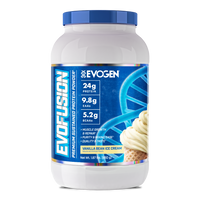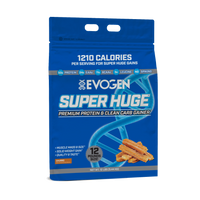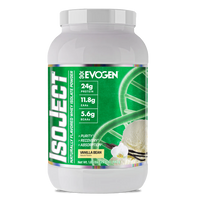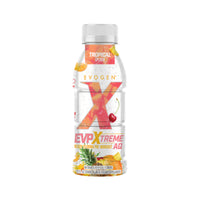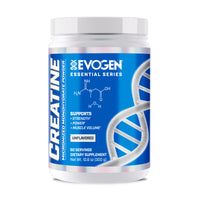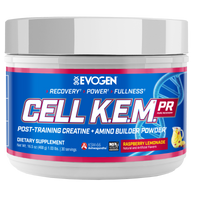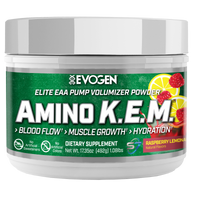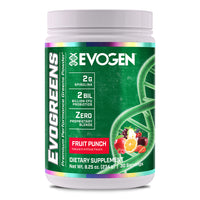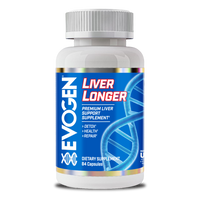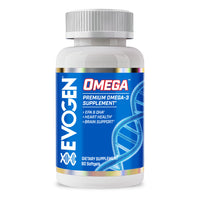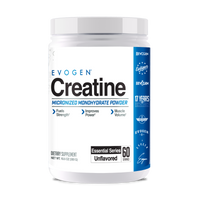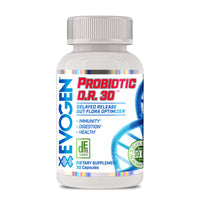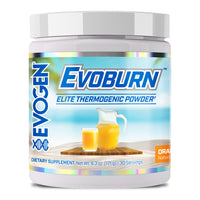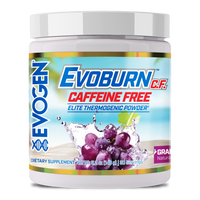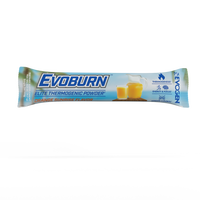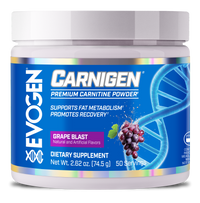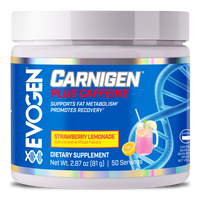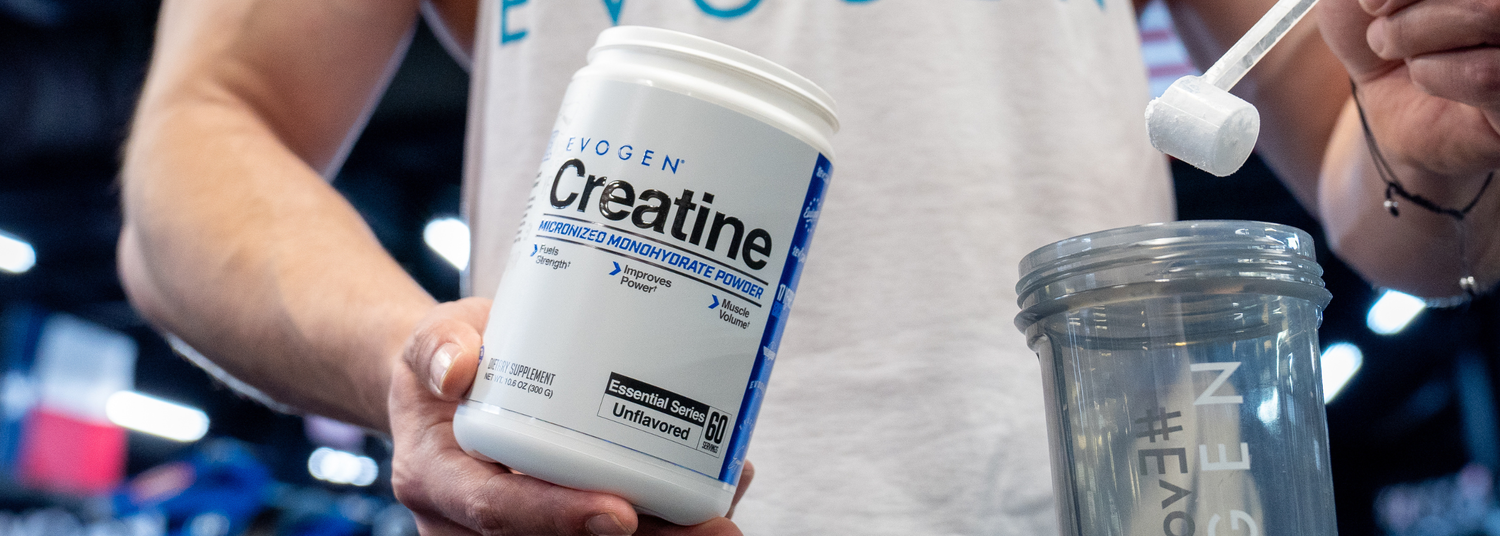If you’ve ever asked yourself, “Does creatine make you gain weight?” you’re not alone. It’s one of the most common questions athletes, lifters, and everyday gym-goers have before starting supplementation.
The short answer: yes, but not in the way most people fear. The initial weight gain from creatine comes from extra water inside your muscle cells, not fat. And over time, consistent training with creatine supplementation can help you add lean muscle mass, the kind of weight you actually want.
With Evogen’s Creatine Monohydrate, you’re getting a formula backed by decades of research. Used correctly, it supports the drive, discipline, and consistency that define elite performance.
How Creatine Works in Your Body
Creatine is a naturally occurring compound already stored in your muscle cells. When you take a creatine supplement, your body converts it into phosphocreatine, which acts as a reserve energy source during high-intensity exercise.
Think of it like having a backup battery for your workouts. That extra energy lets you grind out more reps, push heavier weights, and recover faster. Over time, that increased workload turns into real strength and muscle gains.
- Boosts ATP (your body’s energy currency) for intense training
- Enhances strength and endurance during resistance training
- Supports brain health and cognitive performance
- Works best when combined with consistent training and recovery
Research consistently shows that creatine monohydrate is the most effective form of creatine. We created our Creatine Monohydrate with you in mind, focusing on purity, absorption, and results. Whether you’re a hardcore lifter or a weekend warrior, you get access to the same standard of excellence trusted by Hany Rambod’s athletes, the 25x Olympia-winning coach behind Evogen Nutrition and legends like Phil Heath and Hadi Choopan.
How Creatine Supercharges Exercise Performance
Creatine’s biggest impact isn’t just size; it’s performance. By increasing ATP availability, creatine helps you train harder and sustain output longer.
Whether you’re sprinting, crushing Olympic lifts, or grinding out high-volume bodybuilding sessions, creatine delays fatigue so you can complete more total work. That extra work translates directly into better gains over time.
Studies show creatine can improve high-intensity exercise capacity by up to 15%. That edge is often the difference between hitting a plateau and making progress; the margin that defines true performance.
Why You See Early Weight Gains
When you first start supplementing, you’ll probably notice the scale jump within the first week, usually 2–4 pounds. Don’t panic. This isn’t fat.
Here’s what’s happening: creatine pulls more water into your muscle cells to help store energy. This intracellular water retention gives your muscles a fuller, stronger look and provides the environment they need to grow.
If you’re following a loading phase (20g/day for 5–7 days), the increase shows up faster. If you start with a steady 3–5g maintenance dose, the change is more gradual but just as effective in the long run. That early water weight isn’t a setback; it’s a signal that creatine is doing its job.
The Role of Glycogen Storage
Creatine also boosts glycogen storage in your muscles. For every gram of glycogen stored, about 3 grams of water come with it. That’s more fuel for your workouts, more endurance in your training, and yes, a little more scale weight. But again, it’s functional, not fat.
From Water Weight to Muscle Growth
Once your muscles are saturated and you’ve been training consistently, creatine goes beyond water weight. Over 4–8 weeks, creatine users can gain an additional 2–4 pounds of lean muscle mass compared to those who don’t supplement.
This isn’t “bulk” you’re stuck with; it’s quality muscle that drives performance and body composition improvements. The process works because:
- You’re able to lift more weight, increasing progressive overload.
- Creatine supports protein synthesis and recovery.
- Hydrated muscle cells create an anabolic environment for growth.
At Evogen, we design our creatine the same way Hany coaches these elite athletes: pure, effective, and built for real results. Our formulations give you strength without unnecessary bloat, so you can trust every scoop to fuel your performance.
Comparing Creatine Monohydrate and HCL
Creatine monohydrate isn’t just the most studied form of creatine; it’s also the most accessible. Because of its simple structure, it’s highly effective at saturating your muscles with phosphocreatine. This saturation is the foundation for strength, recovery, and long-term growth.
Creatine HCL (hydrochloride) is a newer option that dissolves easily in liquid and may feel lighter on digestion. Some athletes like it because it can be taken in smaller doses, but research is still catching up compared to monohydrate’s decades of data.
Other forms like buffered creatine or creatine nitrate exist, but none have shown benefits beyond monohydrate in large-scale studies. At Evogen, we prioritize what’s proven. Our creatine formulations focus on purity and performance, ensuring you get results that match the science, not marketing hype.
The Creatine Loading Phase Explained
The idea of “loading” is often misunderstood. Loading accelerates muscle saturation by frontloading high doses for a short period. You’ll see faster water weight changes and often feel stronger within the first week.
But skipping the loading phase doesn’t mean creatine won’t work. A steady maintenance dose of 3–5 grams daily will still get you to the same saturation point. It just takes longer, usually about 3–4 weeks. This slow-and-steady approach is ideal for those who prefer gradual progress or compete in weight-class sports.
Think of loading as the fast track and maintenance-only as the scenic route. Both get you to the same destination; it’s about choosing the method that aligns with your goals and lifestyle.
Creatine and Body Composition
Creatine has a reputation for making muscles look “puffy,” but that’s a misunderstanding. The water it pulls into your muscles is intracellular, meaning it goes inside the muscle cells, where it enhances fullness, performance, and recovery, not under the skin like bloating.
This increased cell volume actually signals your body to switch into a more anabolic state. That means improved protein synthesis and better retention of lean muscle, both of which play a major role in body recomposition. Over time, this shift leads to more lean mass and less fat mass when paired with disciplined training and nutrition.
For transformation seekers, creatine helps bridge the frustrating gap between dieting and progress. Instead of losing both fat and muscle in a calorie deficit, creatine protects your hard-earned muscle, so the weight you lose is more likely to come from fat.
The Hidden Link Between Hydration, Electrolytes, and Creatine
When you’re supplementing with creatine, hydration is non-negotiable. Because creatine pulls water into your muscle cells, failing to drink enough can leave you feeling flat, sluggish, or even lightheaded during workouts. The solution isn’t to cut creatine; it’s to increase water intake.
Electrolytes are equally important. Sodium, potassium, magnesium, and calcium all work together to balance fluid shifts and ensure your muscles contract properly. Without them, hydration alone won’t cut it. That’s why Evogen formulas are designed to pair seamlessly with products like Amino K.E.M., which replenishes electrolytes while fueling recovery.
If you’re serious about maximizing pumps and vascularity, don’t miss our guide on FST-7 training tips for vascularity.
Instead of fearing water weight, embrace hydration as part of your training strategy. Well-hydrated muscles aren’t just bigger; they’re stronger, more resilient, and primed for growth.
Creatine Timing and Dosage Best Practices
Consistency is king when it comes to creatine. It doesn’t matter whether you take it in the morning, night, pre-workout, or post-workout; what matters is that you take it daily. Over time, this keeps your muscles fully saturated and performing at their peak.
That said, research suggests post-workout timing with protein and carbs may give a slight absorption boost. This is because insulin helps shuttle creatine into your muscle cells. Pairing creatine with Evogen’s IsoJect protein after training ensures maximum uptake while also fueling recovery.
As for dosage, most people thrive on 3–5 grams daily. Larger athletes may benefit from closer to 6–7 grams. The key is consistency, not cycling; creatine works long-term, and your body adapts positively to continuous use.
Does Creatine Make You Gain Fat?
Here’s the truth: creatine does not cause fat gain.
The confusion comes from seeing the scale go up quickly in the first week. But that’s water, not fat. In fact, by helping you train harder and add lean muscle, creatine can actually support fat loss. More muscle means a higher metabolism and more calories burned, even at rest.
Long-Term Safety and Research Backing
Creatine is one of the most extensively researched supplements in sports nutrition. Decades of clinical trials have shown it’s safe for healthy adults, with no evidence of harm to kidney or liver function when used properly. In fact, creatine is often studied for its therapeutic benefits in clinical populations.
Emerging research suggests creatine supports cognitive health, memory, and even protection against neurological decline. This makes it valuable not just for athletes but for anyone interested in long-term vitality and brain function.
Creatine Beyond Athletes and Everyday Benefits
Creatine isn’t just for Olympians and powerlifters; it’s for anyone who wants to move, think, and perform better. Everyday warriors juggling careers and families can benefit from creatine’s ability to support short, intense workouts that fit into busy schedules.
Longevity optimizers also find value in creatine. As we age, maintaining lean muscle mass becomes harder, and creatine helps protect against that decline. Add in potential cognitive benefits, and creatine becomes a tool for staying strong and sharp well into your 40s, 50s, and beyond.
For transformation seekers, creatine offers hope in plateaus. By protecting muscle and fueling workouts, it creates a more sustainable foundation for long-term change, without the burnout that often comes from dieting alone.
Picture Yourself Performing with Creatine
Elite athletes like Phil Heath, Jay Cutler, and Hadi Choopan have trusted Evogen strategies that include creatine as a cornerstone. In their world, one rep or one pound can make the difference between victory and second place. Creatine provides that edge by fueling explosive training sessions and recovery between grueling workouts.
But champions aren’t the only ones who benefit. A CrossFit competitor powering through high-intensity intervals, or a weekend warrior tackling a 5K, can use creatine to sustain energy and push performance higher. Even parents who fit in a 30-minute session after work find creatine invaluable for making limited training time more effective.
The athletes you admire aren’t using creatine for hype; they’re using it because it works. And the same results they see in competition are available to you in your everyday training.
Who Should Avoid Creatine?
Creatine is safe for most people, but certain groups should use caution:
- Kidney or liver disease: Consult a healthcare professional before use.
- Pregnant or breastfeeding women: Avoid creatine due to limited research.
- Teenagers: May benefit, but only under professional supervision with proper dosing.
Creatine is one of the safest supplements when used responsibly. Choosing a trusted brand like Evogen Nutrition ensures purity and reduces the risk of low-quality ingredients.
Fueling Growth With Creatine
So, does creatine make you gain weight? Yes, but it’s the kind of weight that drives you forward. Those first few pounds of water weight prime your muscles to perform at a higher level, recover faster, and build lean mass more effectively.
Over time, creatine becomes less about water and more about real strength and muscle gains. Combined with disciplined training and recovery, it’s one of the most powerful tools for body transformation.
With Evogen’s Creatine Monohydrate, we don’t cut corners. We formulate it the way our athletes demand: pure, effective, and proven.
Never Quit. Never Alone. Never Enough.

